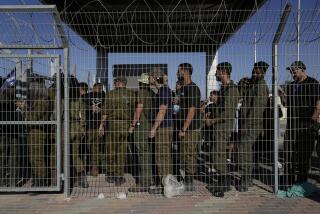Isolation prisons under fire
- Share via
Civil rights activists plan to file a lawsuit today contesting the transfer of a Tunisian American prisoner to a federal prison facility that some inmates have dubbed “Little Guantanamo.”
The suit by the American Civil Liberties Union on behalf of Sabri Benkahla could be the first of many challenging the secretive units, which drastically restrict outside contact.
Benkahla was transferred to the Communications Management Unit in Terre Haute, Ind., in 2007, eight months after his conviction on perjury and obstruction of justice charges in a terrorism case. Prosecutors contended that he lied to a grand jury about his contact with an alleged Al Qaeda fundraiser and other terrorism suspects.
The Terre Haute unit opened in 2006. Another began operations last year at the federal prison in Marion, Ill.
The suit charges that the federal Bureau of Prisons violated Benkahla’s right to due process by pulling him out of the Northeast Ohio Correctional Center with no transfer paperwork, no hearing and no opportunity to contest his transfer beforehand. It also questions the legality of the units.
Similar suits are being prepared by the Center for Constitutional Rights in New York and by attorneys of other inmates, calling the specialized units an unwarranted expansion of the war on terrorism.
Inmates in the units get one 15-minute phone call a week and two two-hour visits a month. They have access to computers, a library, a basketball court and a religious library. Though the rules are more restrictive than those of most federal prisons, they are not as strict as the supermax facility in Florence, Colo., which houses terrorists such as unabomber Theodore Kaczynski.
The Bureau of Prisons said the list of inmates in the units was not a matter of public record. It said it needed to monitor communications involving the prisoners because they posed a public-security risk.
“The Communications Management Unit (CMU) was established to house inmates who, due to their current offense of conviction, offense conduct, or other verified information, require increased monitoring of communications between the inmate and persons in the community in order to protect the safety, security and orderly operation of Bureau facilities, and to protect the public,” the bureau said in written response to questions from The Times.
But civil rights attorneys contend that the communications restrictions serve another purpose.
“These are political prisons,” says Rachel Meeropol, a staff attorney at the Center for Constitutional Rights. “These people are being targeted to limit their ability to communicate with the outside world, and to limit their ability to be political people.”
David Shapiro, an attorney with the ACLU National Prison Project working on Benkahla’s case, said, “The fact that somebody like Sabri is in the CMU really shows the need for better procedures before people are thrown in there and kept in there indefinitely.”
Among the inmates at Marion is environmental activist Daniel McGowan, who was convicted in 2007 of burning a lumber company office in Oregon and facilities at an Oregon tree farm that marketed hybrid trees. Federal Judge Ann Aiken added a “terrorism enhancement” to his sentence for the political nature of his acts, resulting in a seven-year term.
In May 2008, McGowan was returning to his cell from lunch at Sandstone, a minimum-security prison in Minnesota, when guards told him to pack.
“My knees kind of buckled when I heard the term ‘CMU,’ ” McGowan said in an interview with The Times. “I was on this bus, and I realized, ‘Oh, my God. This is pretty much what my lawyer had said.’ She said [to the judge], ‘If you give him the terrorism enhancement, the BOP will treat him differently.’ ”
McGowan thinks he was put in the unit because he remained in contact with other activists and published a blog.
Lauren Regan, executive director of the Civil Liberties Defense Center and lead attorney in McGowan’s case, notes that none of McGowan’s co-defendants ended up in the CMU.
“What’s different about Daniel?” she said. “The only difference is the outreach that he was doing and the voice that he had behind bars.”
Benkahla was studying in Medina, Saudi Arabia, in 2003 when Saudi agents picked him up and shipped him back to the United States to face trial in Virginia on charges of providing material support to the Taliban. He was acquitted in 2004.
Federal prosecutors soon called him back before a grand jury, where he lied under oath about e-mail and phone contact with suspected jihadists during travels to Pakistan and possibly Afghanistan. Among the evidence federal prosecutors had were e-mails in which Benkahla talked of “studying in Afghan,” and traveling to a place “far, far away” that was “top secret.” Because the grand jury was part of a terrorism investigation, his recommended three-year sentence was extended to 10 years.
The ACLU lawsuit asks that Benkahla be transferred out of the CMU and that the units be shut down pending full approval under the process required by the federal Administrative Procedures Act. The lawsuit maintains that the Bureau of Prisons violated the provisions of the act by failing to issue a public notice or solicit comments when it set up the units.
The bureau contends that existing federal regulations allow it to set the conditions of prisoners’ confinement.
--
More to Read
Sign up for Essential California
The most important California stories and recommendations in your inbox every morning.
You may occasionally receive promotional content from the Los Angeles Times.










